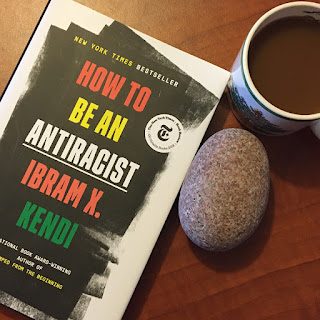Wonderfully Welcoming: Reading How to be an Antiracist
My reading life (and, you know, everything) changed a lot in 2020. Woefully late--far too many years too late--I've begun reading difficult books that relate to racism.
"Difficult" as in "worth doing." "Difficult" as in "prompting re-evaluation of uncomfortable life moments."
NOT "difficult" as in "poorly written" or "wrong."
I can heartily recommend most of the books I've read about Black lives in North America--certainly all of those by Black writers.
This one, How to be an Antiracist, by Ibram X. Kendi, especially. It's valuable not only as a reader but as a writer.
As a reader, I felt that Kendi was my host and companion on a journey. He shows the same generosity of spirit demonstrated in Braiding Sweetgrass, by Robin Wall Kimmerer, who also teaches by invitation and in community.
In some ways, How to be an Antiracist is like other nonfiction. As you can see above, the book is explicitly designed to help people learn. In eighteen chapters, with notes, Kendi defines terms and provides clear descriptions and examples to distinguish between racism and antiracism.
Yet as a reader I never felt lectured to (or despaired of), which is not to say that books demonstrating anger and frustration are wrong. This just didn't feel like that experience.
What was so special about this book? Here's where I find this book valuable also to writers.
Kendi shows, from the very beginning of the book, his own journey to antiracism. This book is personal--Kendi humbly shows his mistaken ideas and beliefs, and their genesis. He credits those generous companions on his own path who helped broaden his horizons, describing how their conversations changed and enriched his thinking.
This is the experience he now creates for the rest of us. Reading his personal story is incredibly effective in helping me drop my defenses. If Kendi had to learn antiracism, then of course I do, too. He's not asking me to do anything that he hasn't already done--in my experience, one quality of a good leader.
And of course writers of personal essays and creative nonfiction already know the value of including their specific experiences. Personal (which is also political) often gives readers a window into a subject. Sometimes, my response is "let me share your experience so I don't have to have it," as I've written about before.
Instead, Kendi's book serves as an invitation to take a walk with him. A heartfelt, effective invitation--that also addresses difficult subjects in clear and compelling writing.
So I recommend this book to anyone looking for ways to learn. And--with so much ahead of us, from pandemic immunization to climate change to reforms in justice and economic systems--to writers who want to address complicated subjects in a generous, effective way.

